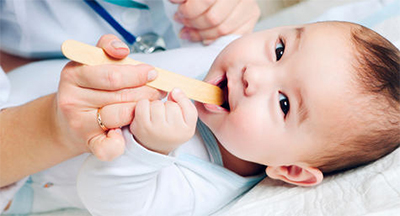Whether you’re a new parent, or one with more experience, it’s important to make sure that you stay up to date on well-child exams. Well-child exams are appointments you schedule with your child’s doctor to track your child’s development and ensure that everything is going well. It also provides a chance for you to ask your doctor any questions about your child’s health and development that may be difficult to address during a normal sick visit.
What to expect
At a well-child exam your child will typically be measured, weighed, given any vaccines they need and screened for developmental delays. Here are some of the basics of what your doctor will examine:
Head. The doctor will check the soft spots of your baby’s head, as well as the shape of the head to make sure everything is developing properly.
Mouth. Your doctor may ask if your baby is drooling or chewing more than usual (first signs of teething), and will check your child’s mouth for signs of infection.
Skin. The doctor will note birthmarks and check for rashes.
Eyes and ears. The doctor will check for abnormal discharge in your baby’s eyes. Using an instrument called anotoscope, your doctor will examine your baby’s ears for any infection or fluid. He or she may also test your baby’s reaction to different sounds.
Heart and lungs. The doctor will listen to your baby’s heart and lungs with a stethoscope to listen for any abnormal heart sounds or any difficulty breathing.
While many times parents use a well-child exam to ask medical questions about their child’s development, they often don’t realize that they can ask other, nonmedical questions about their child. From questions about home safety practices to sleep habits, a well-child exam is meant to help a new parent address all of their concerns, medical or otherwise.
A typical schedule of well-child exams may include an initial visit three to five days after birth, at two weeks and two months, and then every two to three months for the first year. Your doctor can help you determine a schedule of well-child exams that is right for you.
Make the most of your visit
To prepare for each visit, keep a running list of questions or topics of concern that come up as you care for your child. Consider doing some outside research online or in books about specific changes your child may be going through. Addressing these developmental stages can help you feel more comfortable and better prepared to handle them.
Don’t hesitate to share any information that may help the doctor get to know your child better and answer your questions more effectively. These exams are a chance for you and your child to build a positive relationship with your doctor. A strong relationship can lead to better and more personalized care for your child.




